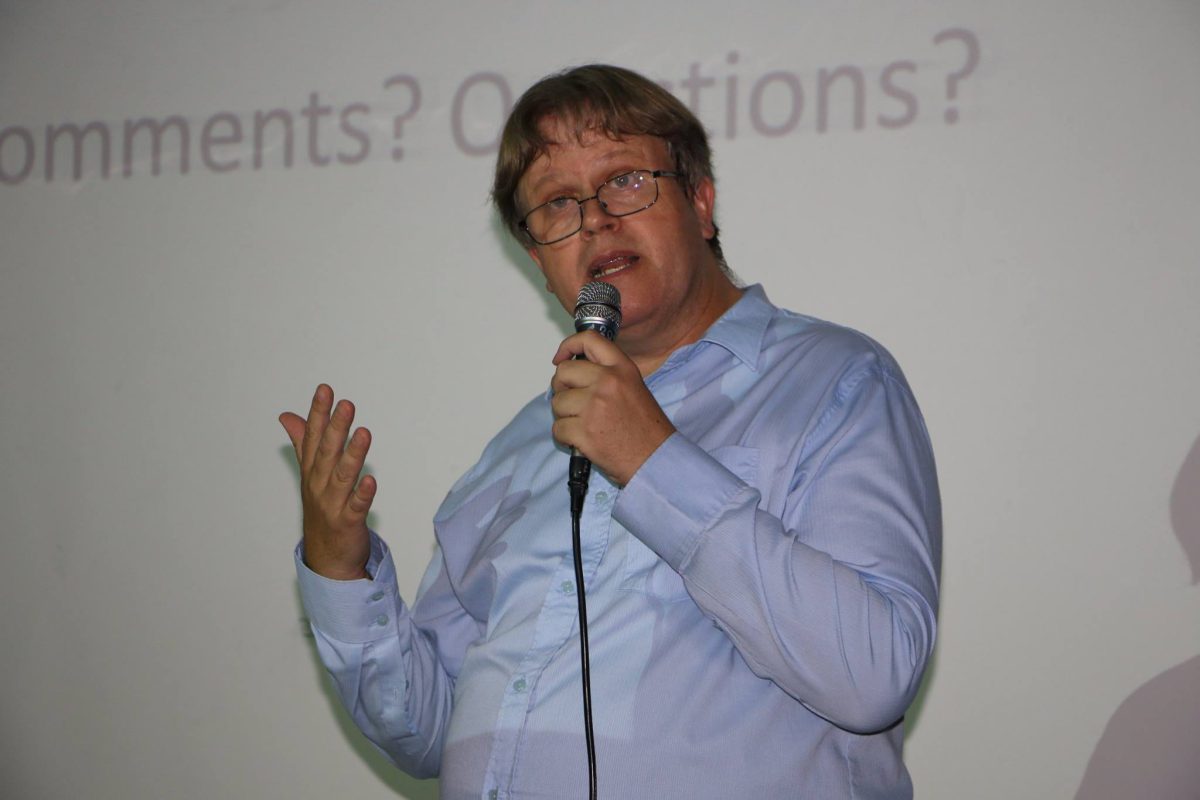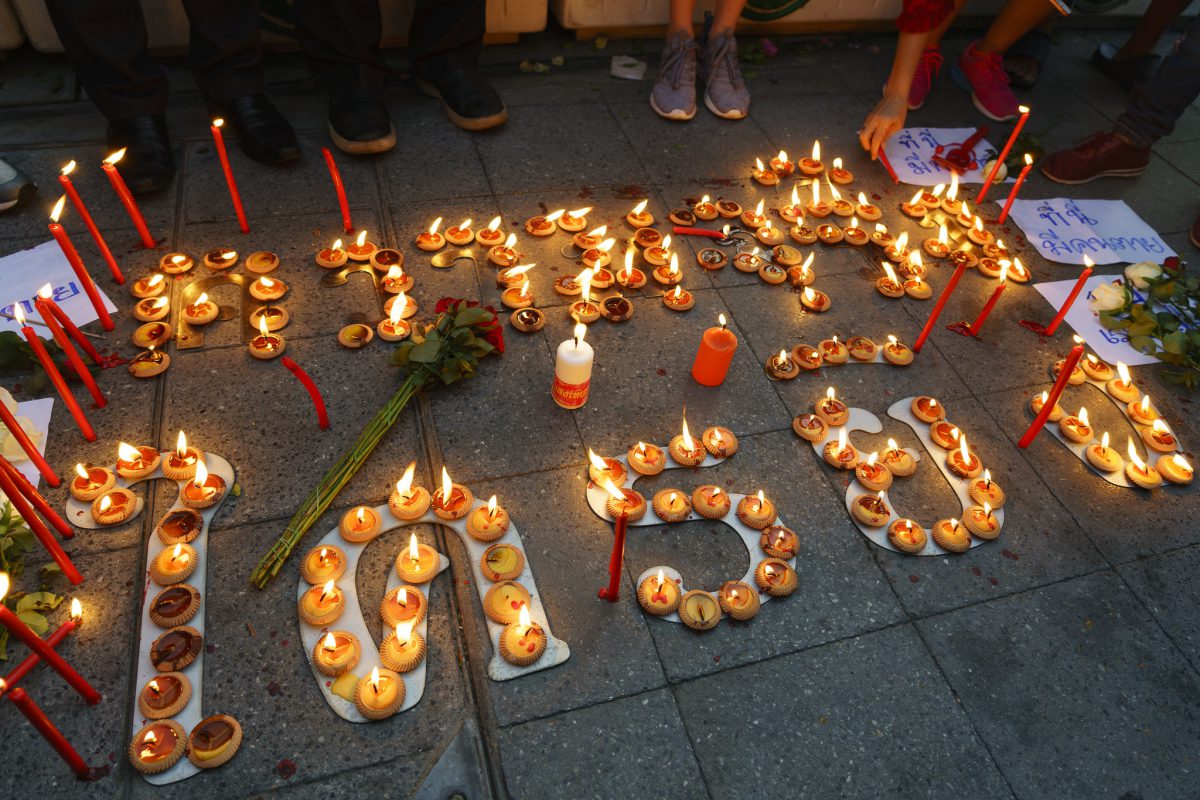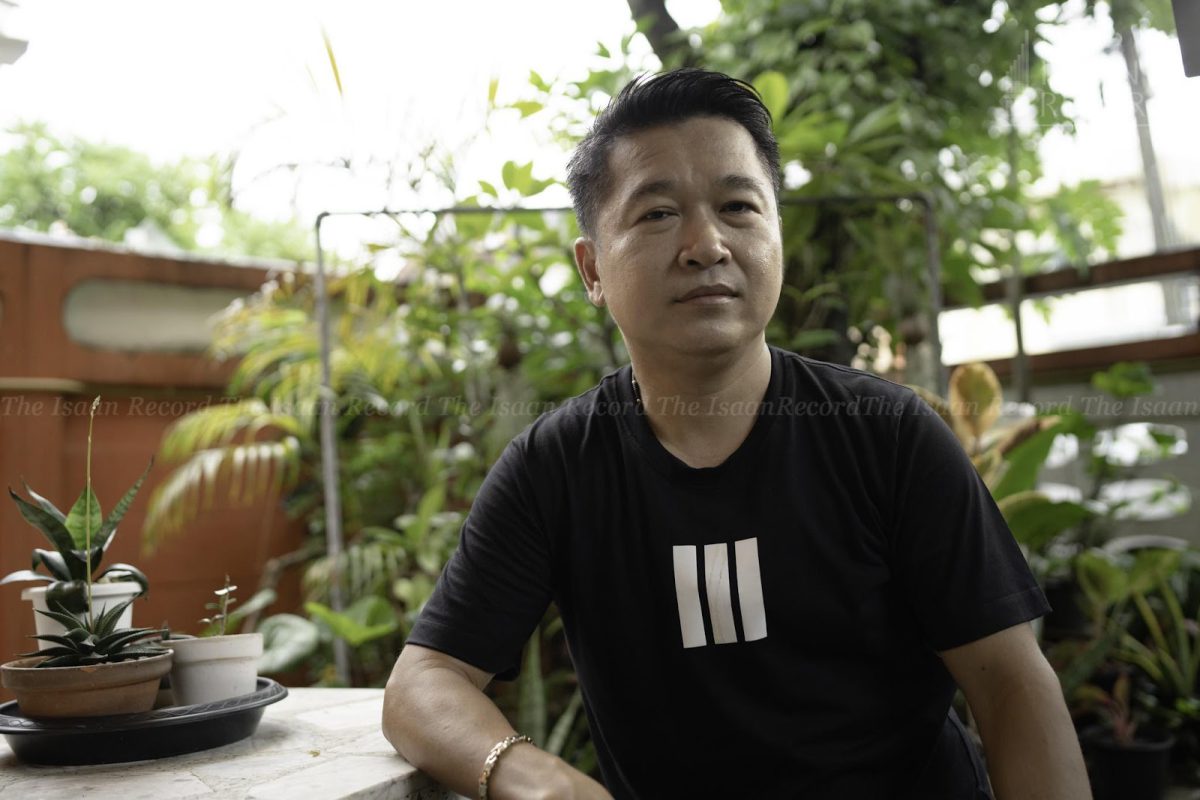Saratsanun Unnopporn may be a new face for Pheu Thai Party (PTP) voters in Khon Kaen, but she’s not new to politics. Her mother was elected three times to the House of Representatives and Saratsanun says her mother is still in a continual campaign mode in their home in Phon District .
Saratsanun is only one of three Pheu Thai candidates in Khon Kaen Province who’s a woman. She’s also one of the youngest. The 30-year-old candidate seems thoroughly modern and career-driven: she’s fluent in English, she’s gotten an M.A. in international relations in South Korea and she’s working on her Ph.D. in public administration. Yet, as her nickname–khao fang [“Millet”]– suggests, her modernity is still rooted in her largely rural district in southern Khon Kaen Province.
One of five siblings, she’s the one who’s carrying on the family mantle. She admits that she “has no experience” and she has no illusions about the work she’ll need to do: “It’s not easy to be a politician. It’s not an easy life.” She doesn’t feel obligated to run but made her choice, inspired by witnessing “my parent’s lifetime dedication for their hometown and its people.” After an exhausting day of election rallies last week, she agreed to sit down with The Isaan Record and tell a bit of her story.
The Isaan Record: What are your policies or approach? What’s your hope for the future of the party and the country?
Saratsanun: I simply want the country to move forward and get over this pro-vs. anti-Thaksin or yellow vs. red shirt conflict. The older generation of politicians are filled with a history of being against each other. I think the young don’t really care about that anymore.
We just want to move forward, get on with the actual work of developing our country. This is our country, too. I believe most of the newer generation are thinking the same thing. Quit the fighting and let’s get to the actual work! We volunteer to participate in politics with pure, determined hearts. Such a shame Thailand lost so much time and opportunities in the twelve years since the coup-makers came and never left. I, for one, want a brighter future for my kids in a country where people have well-being and are happy.
IR: Your mother has been the politician of the family. Now you’re taking over from her. Why you?
SU: Before, it was my mother who ran for office. This time, for these elections, I’m replacing her, a member of the new generation. The PTP has considered [the matter] and felt that the children ought to run to prove themselves because they ought to be better able to answer the central question.
The movement of things have changed, the surrounding environment has changed, the world has changed. As for the trend of PTP, this change has in fact become even stronger because in the past four to five years, resentment [over the coup and the military government taking power] has made people want to vote even more. They already have a party in their hearts. They are only waiting for the elections.
As for the new candidates, there is a lot that we have to learn but it’s going well, in passing off from one generation to another, from mother to daughter.

“I simply want the country to move forward and get over this pro-vs. anti-Thaksin or yellow vs. red shirt conflict,” the 30-year-old Pheu Thai candidate, Saratsanun Unnopporn, says. She’s running in Khon Kaen’s Constituency 8 which covers the districts of Phon, Waeng Noi, Waeng Yai, and Khok Pho Chai.
IR: You saw at the rally today that most of the audience were older and more rural voters. And yet there’s the Future Forward Party with a lot of younger candidates. How can you reach both your rural constituency and those of your own generation? Is your youth an obstacle?
SU: Actually, being young is not an obstacle for me at all; it’s not a bad thing at all. In fact, it gives me an upper hand over all other candidates. For the villagers, they are really looking for not just a representative–they’re looking for somebody who will be their voice. Having a new, young person, it’s a kind of hope for them. And once I talk with them, they see what I’m capable of. They’re becoming more optimistic.
The other candidates are often much older. Many of them are retired. Running a campaign like this is one of their choices after they retire. And for most of the people, when they go out there, it’s not so appealing for the voters: ‘Should I vote for this guy or this person?’ because in this desperate situation [voters] really need somebody they can lean on. And then they see me running on and off, on and off like that–they really like me! That’s a benefit of being young.
Maybe I saw from my parents all the time and I’ve been bonding with villagers, like voters, since I was young so I’m very much a natural. I’m not praising myself but I really know how to talk to them. It’s just in my instincts to really go out there [and] ask them how they’re doing. They really like that.
IR: How is it that the party come to choose you as a candidate? What did the party see in you? Did party representatives approach you?
SU: It was me who proposed myself. I had been working as an assistant to [now party leader] Sudarat Keyuraphan. I wanted to help the party, working in Bangkok. PTP wanted to produce a new generation [but] not simply within families. They want the future of the nation to have the human resources, to give the new generation the opportunity to have more involvement in politics. It’s actually changing in many of the districts. [The party] is encouraging the new generation to step in and take this opportunity. [They are] actually giving us the opportunity, for us to be able to be involved in politics and voice our opinions. Most importantly is that [the party] wishes that we as new blood will contribute something even better to the party and to the House of Representatives.
IR: Did you have any hesitation in taking on this challenge?
SU: To be honest, it never occurred to me to be here as a candidate. Working with Khun Sudarat for two years, I could see how it works and I’m very into it–after listening to all the news, all the situations surrounding me. I was, like, ‘If I got this opportunity, I think I could be one of the better choices for voters in my district.’
IR: So when did it first come to you that you should run?
SU: [It came] three years ago, it comes with opportunity. First, it used to be my mom and it has always been her [as the politician]. But I got to work with the party and they saw what I’m capable of, they asked my mom: ‘Do you think it’s possible if we evolve to the newer generation?’ The party is interested in me [as a candidate] and my mom is even happier because the opportunity is passed on to the younger generation.
I think it’s been in my blood but it never really occurred to me just because I didn’t see the opportunity. But then three years ago, I was doing this business. I was in Muang Phon, my district, for a long time. I had at least 60-70 employees. I talked with them a lot. And they were simply villagers–all the people who’ve been suffering from the economic crisis these past years and I thought that if I can contribute at least just a little bit, it would be a good opportunity. That’s all.
IR: Was it your dream to become a politician?
SU: My dream was always to become a teacher, a professor. But dreams can be a lot of things. I still want to be a lecturer. But now that this opportunity has come to me, if it’s going to be successful or not, I think it’s a new life experience to really go out there and talk to the people [about] what’s really going on in our province. And as a new generation, I really think I can more or less contribute good to the community.





